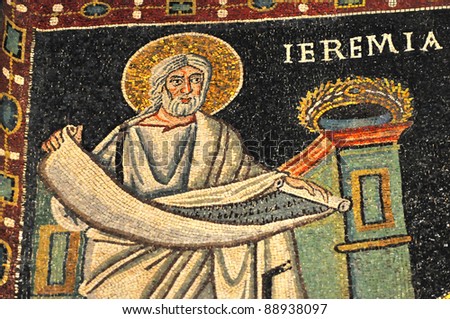"Now the word of the Lord came to me, saying, 'Before I formed you in the womb I knew you, and before you were born I consecrated you; I appointed you a prophet to the nations.' Then, I said, 'Ah, Lord God! Behold, I do not know how to speak, for I am only a youth.' But the Lord said to me, 'Do not say, "I am only a youth"; for to all to whom I send you, you shall go, and whatever I command you, you shall speak. Do not be afraid of them, for I am with you to deliver you, declares the Lord.' Then the Lord put out His hand and touched my mouth. And the Lord said to me, 'Behold, I have put My words in your mouth. See, I have set you this day over nations and over kingdoms, to pluck up and to break down, to destroy and to overthrow, to build and to plant.' And the word of the Lord came to me, saying, 'Jeremiah, what do you see?' And I said, 'I see an almond branch.' Then the Lord said, 'You have seen well, for I am watching over my word to perform it.'" [In Hebrew, "almond" and "watching" are closely similar.]
Notice the pattern here: the calling of God to Jeremiah was prior, not just to his intent, but even to his awareness, even from the womb. The man of God doesn't claim a place in His ministry; he is called to it, even against his expectations and desires: "I am only a youth."
There is a parallel here to the calling of Isaiah, 6:5-9: "And I said: 'Woe is me! For I am lost; for I am a man of unclean lips, and I dwell in the midst of a people of unclean lips; for my eyes have seen the King, the Lord of hosts!' Then one of the seraphim flew to me, having in his hand a burning coal that he had taken from the altar. And he touched my mouth and said: 'Behold, this has touched your lips; your guilt is taken away, and your sin atoned for. And I heard the voice of the Lord saying, 'Whom shall I send, and who will go for Us?' Then I said, 'Here am I! Send me.' And He said, 'Go, and say to this people...'", etc.
When he became conscious of God's calling of him, Jeremiah protested because of his youth. Likewise, Isaiah protested his sinfulness. The godly man claims no qualifications, for he can have none to offer. Jeremiah was youthful, and Isaiah was a sinner. Their very disqualifications made room for the grace of God and the working of His Holy Spirit, untarnished by the mediatorship of men.
In contrast, across the page, Jeremiah shows us that prophet whom God has not called, but is rather the mouthpiece of Hell. In 2:7-8, we read, "And I brought you out into a plentiful land to enjoy its fruits and its good things. But when you came in, you defiled My land and made My heritage an abomination. The priests did not say, 'Where is the Lord?' Those who handle the law did not know Me; the shepherds transgressed against Me; the prophets prophesied by Baal and went after things that do not profit." The false preacher turns the people away from their faithfulness, turning from His Law to strange and new doctrines. He continues, in verses 26-27, "As a thief is shamed when caught, so the house of Israel shall be shamed: they, their kings, their officials, their priests, and their prophets, who say to a tree, 'You are my father', and to a stone, 'You gave me birth.'For they have turned their back to Me, and not their face. But in the time of trouble they say, 'Arise and save us.'"
The false preacher is happy to stoke the religiosity of his flock during time of trouble, but the God-called preacher speaks the words of God at all times, whether to break down the resistant or to build up the repentant, for God watches over His word, to perform it (1:12; see also Isaiah 55:11). The God-called preacher speaks the truth to nations and to kingdoms, while the false minister is concerned to tickle the ears of his audience (II Timothy 4:3).

No comments:
Post a Comment